
How Fairtrade empowers women
One benefit of Fairtrade that some people may not know about is how Fairtrade empowers women. This Fairtrade Fortnight, we take a look at how Fairtrade favourites like Divine Chocolate, Cafedirect, Equal Exchange and Lemonaid help the development of women across the world.
Last International Women’s Day, the Fairtrade Foundation wrote about how Fairtrade is empowering women. They do this by:
- Setting standards that don’t discriminate
- Training women to lead
- Seed-funding local women’s initiatives
- Challenging historic gender-based patterns
- Breaking down stereotypes of ‘women’s work’
- Developing interventions to dismantle inequality
When we hear ‘glass ceiling’ we think of business women missing out on boardroom positions because of historic discrimination in the higher ranks of companies.
But there is also a glass ceiling on the other side of the world – in the smallholder cocoa farms of Ghana, women often do most of the physical work, planting and harvesting. But it’s usually their husbands who take crops to market and get paid, so men often control the purse strings. Some husbands and fathers use the money sensibly to benefit the family, but others don’t and often the women are powerless to change this.
The women face other disadvantages too – they are often unable to own land or to apply for credit. Many do not push for their own daughters to be educated, such is the impact of feeling ‘second-class’ within their own communities.
Buying Fairtrade brands helps to change this! Find out more…
Divine Chocolate
Divine is the only chocolate company in the world which is 100% Fairtrade and part owned by the cocoa farmers.
While Fairtrade ensures farmers receive a better deal for their cocoa and additional income to invest in their community, company ownership gives farmers a share of Divine’s profits and a stronger voice in the industry.
Divine Chocolate invests 2% of its annual turnover in programmes that support and empower women, as well as promoting good governance, and research into different farming techniques.
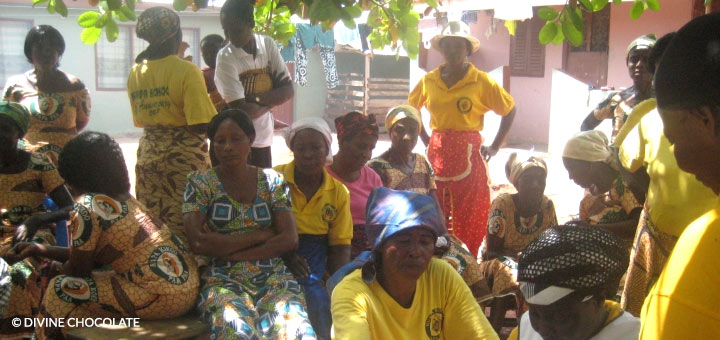
Kuapa Kokoo cocoa farmers’ co-operative, which has more than 83,000 members, co-owns Divine Chocolate. Kuapa Kokoo currently sells about half of its cocoa on Fairtrade terms.
The encouragement and mentoring of women has always been a priority to Kuapa Kokoo, and thousands of women have learned income-generating skills that help them earn money when there is no cocoa to sell. About a third of Kuapa Kokoo’s membership are women. But, disparity in literacy levels negatively affects women – illiteracy amongst men is 65% while amongst the women it is 85%. To address this, Kuapa Kokoo uses financing from Divine’s Producer Supporting and Development fund to run adult literacy and numeracy classes primarily focused on women. These intensive programmes have enjoyed high attendance.
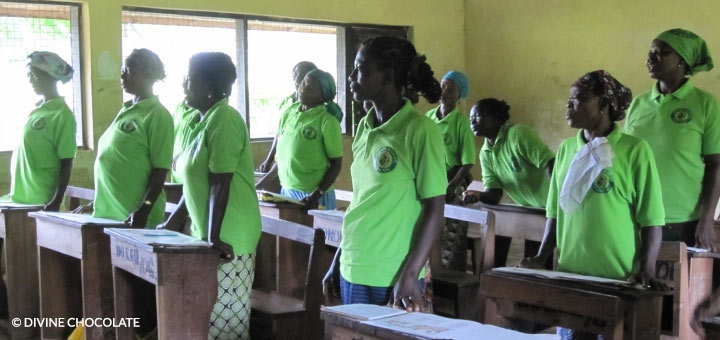
Margret Fianko never went to school but is now a participant in a Divine-funded numeracy and literacy program managed by Kuapa Kokoo, facilitated by Ghana’s Non Formal Education Division. “Before the course I couldn’t do anything; I couldn’t read and couldn’t write. But now I can recognise letters and read.”
She is also putting her newly learned numeracy skills to good use to record expenditure and income of the market stall she runs, and was proud to report that she now knows how much money she makes and only spends the profit. As a member of a Kuapa women’s group Margret is also part owner of a 1 acre community farm.
Read more on the Divine blog.
What do women get out of joining the Kuapa Kokoo cooperative?
Women make up about a third of the membership of Kuapa Kokoo – and the development of the groups and the benefits they bring is a testament to the proactive approach Kuapa has taken to its gender equality programme. The women are not just learning new income-generating skills alongside cocoa farming, but also really honing them. Participation in the groups builds women’s confidence, and they are increasingly putting themselves forward for elected positions in the cooperative, taking on leading roles.
Elizabeth Antegoa lives in Bipoa where the first Kuapa women’s group was formed. “I wanted to be part of the women’s group, ” she says. “We all join together and we help each other. Together we have learned skills like making soap and screen-printing – and this helps us earn our own money.”
Linda Berchie lives in Bassingele in North Western Ghana. Once Linda joined Kuapa Kokoo she enjoyed the benefits of bonuses from the Fairtrade premium fund, as well as the opportunity to attend Annual General Meetings, a chance for everyone to gather and vote on future planning. Through her involvement in Kuapa and its women’s programme, Linda has been elected as Recorder in her village, an important position as she weighs the cocoa beans harvested by members of the village. She also grows her own cocoa and recently became one of just 13 people elected onto Kuapa’s National Executive Committee.
Shop Divine Chocolate ›
Cafédirect
Unlike any other coffee company, Cafédirect invest 50% of profits into PRODUCERS DIRECT, a UK charity that works directly with farmers to improve sustainability and livelihoods, right across the coffee growing world. The charity is run by farmers for farmers, taking leadership and developing innovative solutions to the challenges they face.
With farming being a heavily male and increasingly ageing occupation, the Cafédirect Producers’ Foundation have been working towards engaging youth and women in agriculture. This was a focus in their project Rooted in Quality (RIQ) carried out in Haiti and the Dominican Republic. Around 100 women and youth are receiving loans from the programme, showing some amazing results.
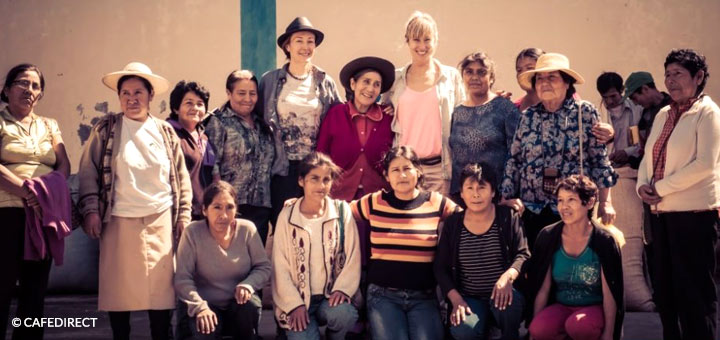
On a visit to Peru, the Cafédirect team enjoyed meeting a group of female farmers. 6,000 feet up in the Andes Mountains, the small farming community of San Fernando includes an all-women committee, something quite rare in coffee growing countries.
Cafédirect’s coffee buyer Jo shared her experience of meeting the farmers. “Electricity arrived in this remote community two weeks ago. As you can imagine, there’s quite a lot of excitement. The road is fairly recent too; before that, mules were used to carry everything from supplies to women in labour to the nearest town – a ten hour trek away.”
Shop Cafedirect ›
Equal Exchange
In 2011, with their partner Twin Trading, Equal Exchange developed their range of Grown by Women coffees. These coffees are sourced directly from the female members of the co-operatives and are fully traceable.
The goal behind this range was two-fold. Firstly they wanted to make the invisible visible. Coffee drinkers have been unaware for decades of the level of work done by women farmers to bring us our daily cup of coffee. Secondly, they wanted to make a difference on the ground and promote gender justice. They wanted to work with co-operatives to develop gender policies and to find ways to enable women to become co-operative members in their own right.
Equal Exchange pay a small women’s premium, and the women farmers decide how this is used. It can go directly back to the farmers who produced the coffee as an incentive for more women to join, or it can be used as a fund to benefit the wider community.
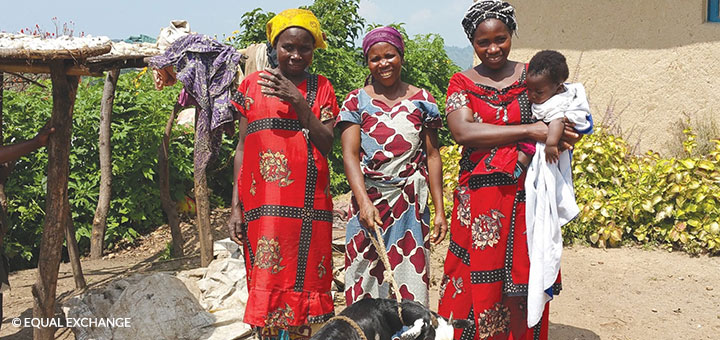
Equal Exchange purchase from women farmer members of SOPEXXCA (Nicaragua), UNICAFEC (Peru) and Gumutindo (Uganda) and although volumes are small, the impact is already being felt. The women themselves are feeling more confident and are pleased that they have a voice which is heard at last:
- In UNICAFEC, Peru, they have been trying to improve the role of women within the co-operative. In 2006 there were 20 female members – now there are 73 and they have representation on the board.
- In SOPEXCCA, Nicaragua, there were just five female members in 2005 and now there are over 280. In Gumutindo, Uganda, there are 76 female members – 13% of the total.
The projects the women’s premium has been spent on is varied, but all make an impact. In Nicaragua this has funded a mobile cervical screening unit. In Unicafec they have been replacing old stoves with efficient new ones.
Shop Equal Exchange products like honey, coffee and olive oil with us ›
Lemonaid & Charitea
Since 2017 the Lemonaid & ChariTea Foundation has supported the ‘Women Loan Project’ of the charitable organisation ‘Rwanda Sustainable Families’ (RSF) in the Rubavu and Rugurero regions of Rwanda. The project enables women from these rural regions to live a financially independent life, improving their living conditions. Read more on their blog.
Albertine Nsangiaranabo is one of the participants and was able to achieve her dream of opening a shop with her first loan. After successful repayment, she was able to receive a second loan which she used to add a small café.
Albertine says: “I am so grateful to be one of Rwanda Sustainable Families’ beneficiaries for all the opportunities I have got from their programs. Today I am no longer a beggar, I am contributing a lot to the development of my family, I am a woman of value within my family.”
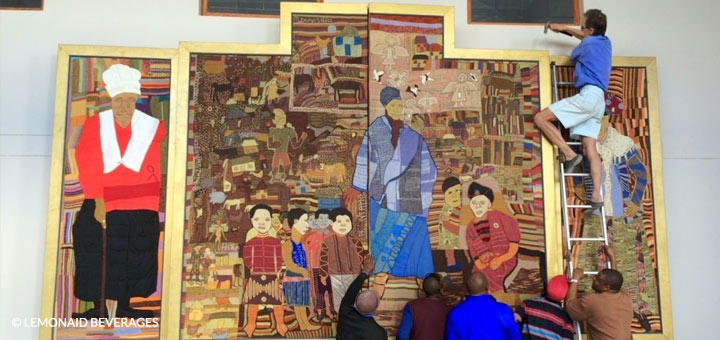
Since 2018 the Lemonaid & ChariTea Foundation has also worked with ‘The Keiskamma Trust’ in the South African rural city of Hamburg, a fishing village which suffers from an unemployment rate of 78%. The Keiskamma Art Project is the flagship of the Trust, which helps women and young people to generate income and build connections and skills in their community.
The Keiskamma Trust deals with issues such as poverty and health, including HIV. It has developed a health programme, an education programme and a music programme to address the challenges of the area with the most holistic approach possible. The Lemonaid & ChariTea Foundation supports the Trust with funding for their art program.
Shop Lemonaid & Charitea >
The Fairtrade benefit
Perhaps Fairtrade’s most famous benefit is the minimum price, which is paid to farmers for their crops, no matter how low the world market price falls. This gives farmers greater security and the ability to plan for the future. This is what your Fairtrade shopping helps guarantee, directly changing lives for women, farmers and suppliers across the world. Fairtrade empowers women, families and communities with every purchase!
Fairtrade Fortnight will be back in 2023 from Monday 23rd February to Sunday 5th March.



